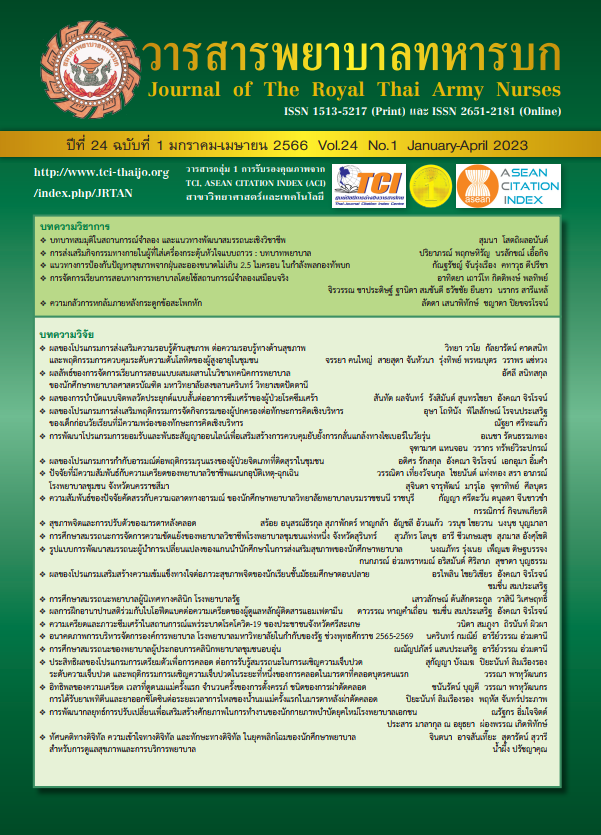The Effects of An Emotion Regulation Program on The Violent Behavior of Schizophrenia Patients with Alcohol Dependency in Community
Keywords:
emotional regulation program, violent behavior, schizophrenia with alcohol dependent patientsAbstract
The purpose of this quasi-experimental research was to determine the effects of an emotion regulation program on the violent behavior of schizophrenia patients with alcohol dependency in the community. The sample consisted of 62 patients with schizophrenia and alcohol dependence aged 18-59 years, recruited using inclusion criteria for patients that were receiving services at a sub-district Health Promotion Hospital in Nakhon Ratchasima in Thailand. They were randomly assigned to the control or experimental group, with 31 patients in each group. The experimental group participated in the emotion regulation program (ER) developed by the researcher based on the emotional regulation therapy concept of McRae and Gross. Their activities comprised 10 sessions, for a period of 10 weeks. The control group received regular care. The measured using the Overt Agitation Scale (OAS), Thai version before and after participating in the emotion regulation program. The data were analyzed using descriptive statistics and t-test.
The results of the study were as follows. 1) The experimental group’s participants mean score for violent behavior on the posttest after participating in the emotional regulation program was lower than their mean score for violent behavior on the pretest before participating in the program at a statistical significance .001 level. 2) The mean difference in the score for violent behavior between the pretest and posttest of the experimental group’s participants in the emotional regulation was significantly higher than the mean difference in the score for the violent behavior of the control group that received regular care at a statistical significance .001 level. In summary, the emotional regulation program was able to reduce the violent behavior of schizophrenic with alcohol dependent patients. Thus, the program can be used as an alternative activity or program to reduce the violent behavior of schizophrenic with alcohol dependent patients.
Downloads
References
Chambers, R. A., Sentir, A. M., Conroy, S. K., Truitt, W. A., & Shekhar, A. Cortical-striatal integration of cocaine history and prefrontal dysfunction in animal modeling of dual diagnosis. Biological psychiatry. 2010,67(8):788-92.
Takviriyanan N. Nursing care of clients receiving psychiatric drugs 3rd. Bangkok: Thammasat University; 2010. 277-34. (in Thai).
Lotrakul M and Sukanit P. Psychiatric Ramathibodi. 4th. Bangkok: Department of Psychiatry, Faculty of Medicine Ramathibodi Hospital, Mahidol University. (2012);129-54. (in Thai).
Petrakis IL. How to best treat patients with schizophrenia and co-occurring alcohol use disorder. The Journal of clinical psychiatry. 2015;76(10):1338-9.
Junsirimongkol B, Suriyachai S, Booncharoen H, Wiroteurairuang K, Joowong S and Khunarak U. Psychiatric comorbidity among in-patients with alcohol use disorders. Journal of Mental Health of Thailand. 2013;21(2):76-87 (in Thai)
Department of Mental Health, Ministry of Public Health. Serious Mental Illness with High Risk to Violence: SMI-V. 1st. Nonthaburi: Prosperous plus company limited printing; 2020. (in Thai)
Nakhon Ratchasima Rajanagarindra psychiatric Hospital. Annual report: Serious Mental Illness with High Risk to Violence (SMI-V) patients. 2020. (in Thai)
Juntapim S and Nuntaboot K. Care of Schizophrenia Patients by the Community. Journal of Nursing Health Care. 2017,36(2):69-76.
Department of Mental Health, Ministy of Public Health. Suicide rate report. 2020 [cited 2020 Oct 17]. Available from: http://Suicide.dmh.go.th
Haenjohn J. Brain & Emotions: A Miracle Connection. Ratchaphruek Journal 2015; 13(3): 11-9. (in Thai)
Sullivan EV, Harris RA, and Pfeffer Baum A. Alcohol’s effects on brain and behavior. Alcohol Research & Health. 2010;33(1-2):127-43.
Gunzerath L, Faden V, Zakhari S, and Warren K. National Institute on Alcohol Abuse and Alcoholism report on moderate drinking. Alcohol: Clinical and Experimental Research. 2014;28(6): 829-47.
Bualakorn N, Soonthornchaiya R, and Vuthiarpa S. The Effects of a Motivation Enhancement Therapy Program with Family Involvement on The Medication Adherence of Inpatients with Co-Occurring Schizophrenia and Alcohol Use Disorder. Journal of The Royal Thai Army Nurses. 2018;19 (Supplement): 423-32. (in Thai).
McRae K and Gross JJ. Emotion regulation. Emotion (Washington, DC). 2020;20(1): 1-9.
Choopan H, Kalantarkousheh SM, Aazami Y, Doostian Y, Farhoudian A, Massah O. Effectiveness of Emotion Regulation Training on the Reduction of Craving in Drug Abusers. Addict Health. 2016;8(2): 68-75.
Yudofsky SC, Silver JM, Jackson W, Endicott J, and Williams D. The Overt Aggression Scale for the objective rating of verbal and physical aggression. The American journal of psychiatry. 1986;143(1):35-39.
Perry Y, Henry JD, Nangle MR, Grisham JR. Regulation of negative affect in schizophrenia: The effectiveness of acceptance versus reappraisal and suppression. Journal of Clinical and Experimental Neuropsychology. 2012;34(5): 497-508.
Painter JM, Stellar JE, Moran EK, Kring AM. A multicomponent approach toward understanding emotion regulation in schizophrenia. Journal of clinical psychology. 2019;75(1): 178-89.
Gross JJ, Jazaieri H. Emotion, Emotion Regulation, and Psychopathology. Clinical Psychological Science. 2014;2(4):387-401.
Cisler JM, Olatunji BO, Feldner MT, Forsyth JP. Emotion Regulation and the Anxiety Disorders: An Integrative Review. Journal of Psychopathology and Behavioral Assessment. 2010;32(1): 68-82.
Grezellschak S, Lincoln TM, Westermann S. Cognitive emotion regulation in patients with schizophrenia: Evidence for effective reappraisal and distraction. Psychiatry Research. 2015;229(1): 434-9.
Azizi A, Borjali A, and Golzari M. The effectiveness of emotion regulation training and cognitive therapy on the emotional and additional problems of substance abusers. Iran Journal of Psychiatry. 2010;5(2): 60-5.
Vancampfort D, De Hert M, Knapen J, Wampers M, Demunter H, Deckx S, et al. State anxiety, psychological stress and positive well-being responses to yoga and aerobic exercise in people with schizophrenia: a pilot study. Disability and Rehabilitation. 2011;33(8): 684-89.
Nowicka M. Emotional regulation in schizophrenia. Personality and Individual Differences. 2014; 60: 56-67.
Downloads
Published
How to Cite
Issue
Section
License
Copyright (c) 2023 Journal of The Royal Thai Army Nurses

This work is licensed under a Creative Commons Attribution-NonCommercial-NoDerivatives 4.0 International License.
บทความหรือข้อคิดเห็นใดใดที่ปรากฏในวารสารพยาบาลทหารบกเป็นวรรณกรรมของผู้เขียน ซึ่งบรรณาธิการหรือสมาคมพยาบาลทหารบก ไม่จำเป็นต้องเห็นด้วย
บทความที่ได้รับการตีพิมพ์เป็นลิขสิทธิ์ของวารสารพยาบาลทหารบก
The ideas and opinions expressed in the Journal of The Royal Thai Army Nurses are those of the authors and not necessarily those
of the editor or Royal Thai Army Nurses Association.






